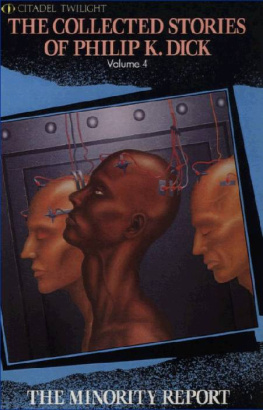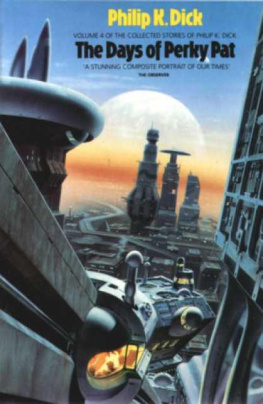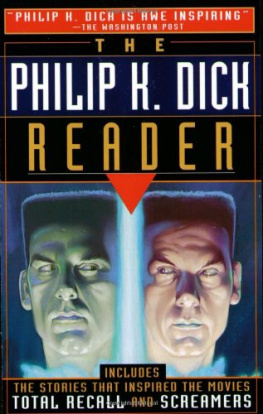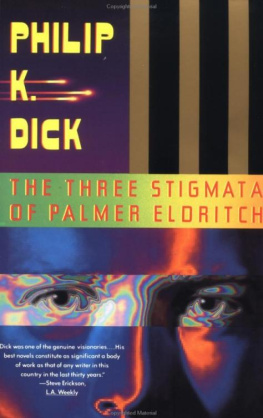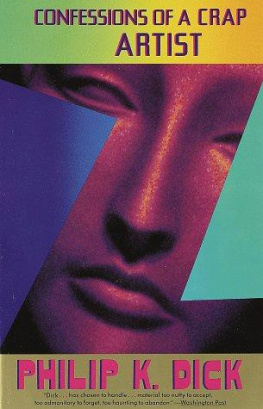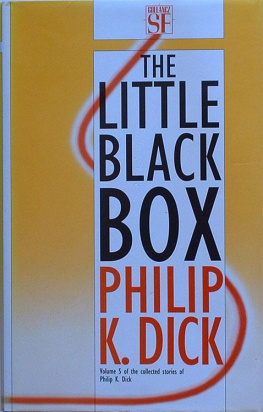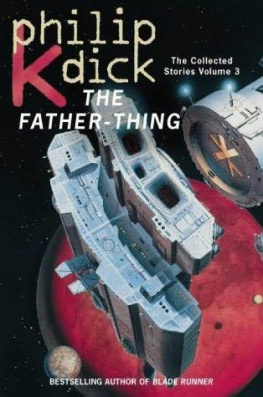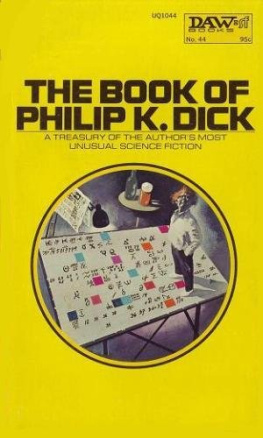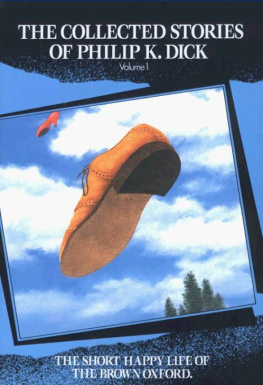Philip K. Dick - Selected stories of Philip K. Dick
Here you can read online Philip K. Dick - Selected stories of Philip K. Dick full text of the book (entire story) in english for free. Download pdf and epub, get meaning, cover and reviews about this ebook. year: 2002, publisher: Pantheon Books, genre: Detective and thriller. Description of the work, (preface) as well as reviews are available. Best literature library LitArk.com created for fans of good reading and offers a wide selection of genres:
Romance novel
Science fiction
Adventure
Detective
Science
History
Home and family
Prose
Art
Politics
Computer
Non-fiction
Religion
Business
Children
Humor
Choose a favorite category and find really read worthwhile books. Enjoy immersion in the world of imagination, feel the emotions of the characters or learn something new for yourself, make an fascinating discovery.

- Book:Selected stories of Philip K. Dick
- Author:
- Publisher:Pantheon Books
- Genre:
- Year:2002
- Rating:5 / 5
- Favourites:Add to favourites
- Your mark:
- 100
- 1
- 2
- 3
- 4
- 5
Selected stories of Philip K. Dick: summary, description and annotation
We offer to read an annotation, description, summary or preface (depends on what the author of the book "Selected stories of Philip K. Dick" wrote himself). If you haven't found the necessary information about the book — write in the comments, we will try to find it.
Selected stories of Philip K. Dick — read online for free the complete book (whole text) full work
Below is the text of the book, divided by pages. System saving the place of the last page read, allows you to conveniently read the book "Selected stories of Philip K. Dick" online for free, without having to search again every time where you left off. Put a bookmark, and you can go to the page where you finished reading at any time.
Font size:
Interval:
Bookmark:

Clans of the Alphane Moon
Confessions of a Crap Artist
The Cosmic Puppets
Counter-Clock World
The Crack in Space
Deus Irae (with Roger Zelazny)
The Divine Invasion
Do Androids Dream of Electric Sheep?
Dr. Bloodmoney
Dr. Futurity
Eye in the Sky
Flow My Tears, the Policeman Said
Galactic Pot-Healer
The Game-Players of Titan
The Man in the High Castle
The Man Who Japed
Martian Time-Slip
A Maze of Death
Now Wait for Last Year
Our Friends from Frolix-8
The Penultimate Truth
Radio Free Albemuth
A Scanner Darkly
Simulacra
Solar Lottery
The Three Stigmata of Palmer Eldritch
Time Out of Joint
The Transmigration of Timothy Archer
Ubik
The Unteleported Man
VALIS
Vulcan's Hammer
We Can Build You
The World Jones Made
The Zap Gun
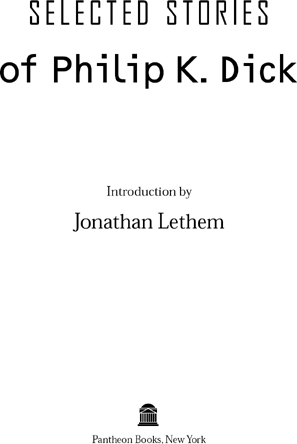
Philip K. Dick is a necessary writer, in the someone-would-have-had-to-invent-him sense. He's American literature's Lenny Bruce. Like Bruce, he can seem a pure product of the 1950s (and, as William Carlos Williams warned, pure products of America go crazy), one whose iconoclastic mal-adaptation to the conformity of that era seems to shout ahead to our contemporary understanding. And, as with Bruce, the urge to claim him for any cultural roleHippie, Postmodern Theorist, Political Dissident, Metaphysical Guruis defeated by the contradictions generated by a singular and irascible persona. Still, no matter what problems he presents, Dick wielded a sardonic yet heartbroken acuity about the plight of being alive in the twentieth century, one that makes him a lonely hero to the readers who cherish him.
Dick's great accomplishment, on view in the twenty-one stories collected here, was to turn the materials of American pulp-style science fiction into a vocabulary for a remarkably personal vision of paranoia and dislocation. It's a vision as yearning and anxious as Kafka's, if considerably more homely. It's also as funny. Dick is a kitchen-sink surrealist, gaining energy and invention from a mad piling of pulp SF tropesand clichs into his fiction: time travel, extrasensory powers, tentacled aliens, ray guns, androids and robots. He loves fakes and simulacra as much as he fears them: illusory worlds, bogus religions, placebo drugs, impersonated police, cyborgs. Tyrannical world governments and ruined dystopian cities are default settings here. Not only have Orwell and Huxley been taken as givens in Dick's worlds, so have Old Masters of genre SF like Clifford Simak, Robert Heinlein, and A. E. Van Vogt. American SF by the mid-1950s was a kind of jazz, stories built by riffing on stories. The conversation they formed might be forbiddingly hermetic, if it hadn't quickly been incorporated by Rod Serling and Marvel Comics and Steven Spielberg (among many others) to become one of the prime vocabularies of our age.
Dick is one of the first writers to use these materials with self-conscious absurditya look at what I found! glee which prefigures that of writers like Kurt Vonnegut, George Saunders, and Mark Leyner. Yet having set his characters loose inside his Rube Goldbergian inventions, Dick detailed their emotional abreactions with meticulous sympathy. His people eke out their days precariously, never knowing whether disaster is about to come at the level of the psychological, the ontological, or the pharmacological. Even his tyrannical world dictators glance neurotically over their shoulders, wondering if some higher authority is about to cause their reality to crumble or in some other way be exposed as fake. Alternately, they could always simply be arrested. Dick earned his collar as High Priest of the Paranoids the old-fashioned way: in his fiction, everyone is always about to be arrested.
The second set of motifs Dick employed was more prosaic: a perfectly typical 1950s obsession with the images of the suburbs, the consumer, the bureaucrat, and with the plight of small men struggling under the imperatives of capitalism. If Dick, as a bearded, drug-taking Californian, might have seemed a candidate for Beatdom (and in fact did hang out with the San Francisco poets), his persistent engagement with the main materials of his culture kept him from floating off into reveries of escape. It links him instead to writers like Richard Yates, John Cheever, and Arthur Miller (the British satirist John Sladek's bull's-eye Dick parody was titled Solar Shoe Salesman). Dick's treatment of his realist material can seem oddly cursory, as though the pressing agenda of his paranoiac fantasizing, which would require him to rip the facade off, drop the atomic bomb onto, or otherwise renovate ordinary reality, made that reality's actual depiction unimportant. But no matter how many times Dick unmasks or destroys the Black Iron Prison of American suburban life, he always returns to it. Unlike the characters in William S. Burroughs, Richard Brautigan, or Thomas Pynchon, Dick's characters, in novels and stories written well into the 1970s, go on working for grumbling bosses, carrying briefcases, sending interoffice memos, tinkering with cars in driveways, sweating alimony payments, and dreaming of getting away from it alleven when they've already emigrated to Mars.
Though Dick's primary importance is as a novelist, no single volume better encompasses his accomplishment than this collection, which doubles as a kind of writer's autobiography, a growth chart. From Twilight Zoneish social satires (Roog,Foster, You're Dead) to grapplings with a pulp-adventure chase-scene mode that was already weary before Dick picked it up (Paycheck, Imposter), the earliest pieces nevertheless declare obsessions and locate methods that would serve for thirty-odd years. In Adjustment Team and Autofac we begin to meet the Dick of the great sixties novels, his characters defined by how they endure more than by any triumph over circumstance.Upon the Dull Earth presents an eerie path-not-taken into Gothic fantasy, one that reads like a Shirley Jackson outtake. Then there is the Martian-farmer-migr mode, which always showed Dick at his best: Precious Artifact and A Game of Unchance. Later, in Faith of Our Fathers, we encounter the Dick of his late masterpiece A Scanner Darkly, working with the I Ching at one elbow and the Physicians' Desk Reference at the other. Faith of Our Fathers, together with The Electric Ant and A Little Something for Us Tempunauts, offers among the most distilled and perfect statements of Dick's career: black-humor politics melting away to Gnostic theology, theology to dire solipsism, solipsism to despair, then love. And back again.
If Dick thrived on the materials of SF, he was less than thrilled with the fate of being only an SF writer. Whether or not he was ready for the world, or the world ready for him, he longed for a respectable recognition, and sought it variously and unsuccessfully throughout his life. In fact, he wrote eight novels in a somber realist mode during the 1950s and early 1960s, a shadow career known mainly to the agents who failed to place the books with various New York publishers. It's stirring to wonder what Dick might have done with a wider professional opportunity, but there's little doubt that his SF grew more interesting for being fed by the frustrated energies of his mainstream ambition. Possibly, too, a restless streak in Dick's personality better suited him for the outsider-artist status he tasted during his lifetime. Dick was obsessed with stigma, with mutation and exile, and with the recurrent image of a spark of life or love arising from unlikely or ruined places: robot pets, discarded appliances, autistic children. SF was Dick's ruined site. Keenly engaged with his own outcast identity, he worked brilliantly from the margins (in this regard, it may be possible to consider the story The King of the Elves as an allegory of Dick's career). Sci-Fi Writer became a kind of
Font size:
Interval:
Bookmark:
Similar books «Selected stories of Philip K. Dick»
Look at similar books to Selected stories of Philip K. Dick. We have selected literature similar in name and meaning in the hope of providing readers with more options to find new, interesting, not yet read works.
Discussion, reviews of the book Selected stories of Philip K. Dick and just readers' own opinions. Leave your comments, write what you think about the work, its meaning or the main characters. Specify what exactly you liked and what you didn't like, and why you think so.

